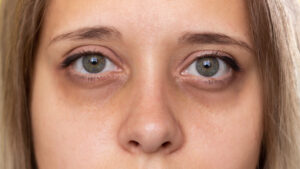Understanding Dark Circles: It’s Not Just About Sleep
Gone are the days when dark circles were simply blamed on sleepless nights. While those late nights can play a role, the truth is that these under-eye shadows can tell a deeper story about our health and habits. Understanding why you have dark circles is the key to finding the best way to tackle them.
Why Do Adults Get Dark Circles?
Let’s dive into the common causes, lifestyle factors, and sometimes even medical reasons behind those pesky circles:
Common Culprits:
- It’s in Your Genes: If your family members have dark circles, you’re more likely to experience them too. Fair skin tends to show them more prominently since the blood vessels underneath peek through easier.
- The Aging Factor: As we get older, our skin thins out and loses some of its elasticity. This can make those under-eye blood vessels more noticeable.
- Sleep Matters, but: Yes, not getting enough shut-eye can worsen dark circles, but it’s not the whole story.
- Eyestrain in the Digital Age: Staring at screens all day puts a strain on your eyes and can enlarge the blood vessels around them, making dark circles more obvious.
- Hydration is Key: Dehydrated skin looks dull and can make circles more apparent. Drinking enough water (and getting electrolytes) makes a difference!
- Your Diet & Lifestyle Show: Eating poorly, smoking, and excessive alcohol can all take a toll on your skin health, including the under-eye area.
Medical Reasons to Consider
- Allergies: When your allergies flare up, it can cause inflammation and make those under-eye blood vessels swell, worsening dark circles.
- Skin Conditions: Eczema and other skin issues can lead to itchiness and rubbing, which darkens the skin.
- Anemia: If you have iron-deficiency anemia, it means less oxygen reaches your tissues, including your under-eye skin, causing a darkening effect.
- Check Your Liver: Sometimes liver issues can show up as under-eye darkness. This requires a doctor’s evaluation.
It’s Not Just About Looking Tired: The Impact of Dark Circles
While dark circles are primarily a cosmetic concern, they can impact our self-esteem and how others perceive us. Feeling self-conscious about them is completely normal!
What Can You Do? Prevention and Solutions
- Prioritize Sleep: Aim for 7-8 hours of quality sleep for overall health and skin benefits.
- Eat for Healthy Skin: Think colourful fruits and veggies, rich in antioxidants and essential nutrients your skin loves.
- Mindful Skincare: Choose eye creams containing ingredients like vitamin C, retinol, or caffeine, but be realistic about expectations.
- Stay Hydrated: Water is your skin’s best friend!
- Manage Stress: Stress impacts our overall health and can show up as skin concerns, including dark circles. Find healthy ways to de-stress.
Treatment Options: From Home Remedies to Medical Procedures
- Home Remedies: Cold compresses, cucumber slices, and tea bags can offer temporary, soothing relief.
- Over-the-Counter Products: Many eye creams target dark circles with varying levels of effectiveness. Look for ingredients backed by some research.
- Medical Treatments: If dark circles are a significant concern, dermatologists can offer lasers, fillers, or other procedures.
When to See a doctor
If your dark circles are persistent, especially if accompanied by other symptoms like fatigue or swelling, it’s always a good idea to check in with your doctor to rule out any underlying medical issues.
The Bottom Line
Dark circles are about more than just a bad night’s sleep. Understanding the “why” behind your shadows empowers you to find the best solutions. By adopting healthier habits, choosing the right products (if you wish to), and knowing when to seek professional guidance, you can brighten your under-eye area and boost your overall well-being.


